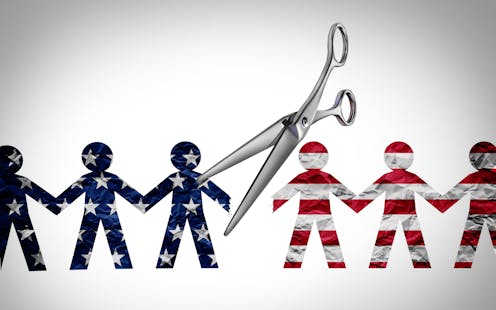Rising partisanship is making nonprofits more reluctant to engage in policy debates − new research
- Written by Heather MacIndoe, Associate Professor of Public Policy, UMass Boston

Afraid of partisan rancor, nonprofits are biting their tongues, with divisive politics hindering public policy engagement by social service organizations[1]. This is one of our findings in a new study[2] we conducted on behalf of Independent Sector[3] – a coalition of nonprofits, foundations and corporate giving programs.
Although the law bars charitable nonprofits from endorsing political candidates, charities are allowed to engage in at least some advocacy, lobbying[4] and public affairs work tied to issues that are relevant to their own work. For example, a food pantry can hold an event about food insecurity[5] in its neighborhood. Or the executive director of a homeless shelter can lobby elected officials about proposed zoning changes that would interfere with a planned expansion.
Nonprofit advocacy involves attempts to influence government policy. This may include some lobbying[6], along with information-sharing activities, such as sponsoring events to raise public awareness of an issue, conducting research, or educating the public about policies that affect an organization.
We, scholars[7] who research[8] nonprofits[9], spoke with a diverse sample of nonprofit leaders to learn about their organizations’ policy engagement.
Some of the 40 executive directors of social service nonprofits across the nation whom we interviewed had engaged in advocacy, and others had not. The groups were of different sizes and were founded at different times. They were located in red, blue and purple states.
Our team set out to identify some of the causes of a decline in nonprofit advocacy through these interviews.
A few of these nonprofit leaders indicated that they lack expertise or don’t fully understand the restrictions they face regarding advocacy. We also heard many of these executives express concerns about partisanship and political polarization.
As this growing divisiveness has permeated even the most local aspects of American life[10], many food pantries, homeless shelters and other social service nonprofits are hesitating to take policy positions that may appear partisan to members of their local communities or donors.
When addressing a social media post about Israel and Palestine that had been misconstrued and sparked controversy, the leader of a legal services nonprofit remarked: “The more polarized we are as Americans, the harder it becomes for us to have an open conversation.”
Other nonprofits feared the consequences of any kind of engagement regarding policy questions.
“Nonprofits sometimes are afraid to engage with government officials,” a food security nonprofit leader said, because that advocacy might lead to “some form of retaliation” by the authorities.
Another concern they expressed: Advocacy might alienate donors who disagree with the nonprofit leaders’ stances.
“It’s like there’s no middle ground anymore,” said the executive director of an emergency housing center. Others discussed how polarization has led to more divisions in board rooms and the loss of donors. That makes it harder for these organizations to decide to take a public stand on many issues.
Why it matters
This study followed up on an earlier stage of our research[12], which showed that nonprofit advocacy and lobbying had declined over the past two decades.
Extreme partisanship weakens democracy[13] and erodes social relationships[14].
We find this trend especially concerning because charitable nonprofits often serve as a voice for many people who don’t have one in American society.
As a result, when nonprofits fail to engage in the policy process, those voices go unheard, and their needs may become more likely to go unmet. One reason for this is that the people with direct expertise aren’t weighing in on policies that could reduce the need for those services in the first place.
“The loudest voices are the ones that get heard,” as one nonprofit leader put it. The “people we support don’t have a voice.”
What still isn’t known
We don’t know how polarization might affect longer-term engagement by the nonprofit sector.
Indeed, some of these organizations have stepped up their advocacy efforts over the past five years, and some took strategic steps to buffer their organizations from resistance to policy engagement, such as by replacing board members who were opposed to taking policy stances that represented their clients’ interests.
Future research is needed to understand these dynamics more fully and how nonprofits respond to prolonged contentious political discourse.
The Research Brief[15] is a short take about interesting academic work.
References
- ^ social service organizations (www.irs.gov)
- ^ in a new study (independentsector.org)
- ^ Independent Sector (independentsector.org)
- ^ engage in at least some advocacy, lobbying (theconversation.com)
- ^ hold an event about food insecurity (theconversation.com)
- ^ may include some lobbying (theconversation.com)
- ^ scholars (scholar.google.com)
- ^ research (scholar.google.com)
- ^ nonprofits (scholar.google.com)
- ^ local aspects of American life (theconversation.com)
- ^ Robert Gauthier/Los Angeles Times via Getty Images (www.gettyimages.com)
- ^ earlier stage of our research (theconversation.com)
- ^ weakens democracy (theconversation.com)
- ^ erodes social relationships (theconversation.com)
- ^ Research Brief (theconversation.com)







